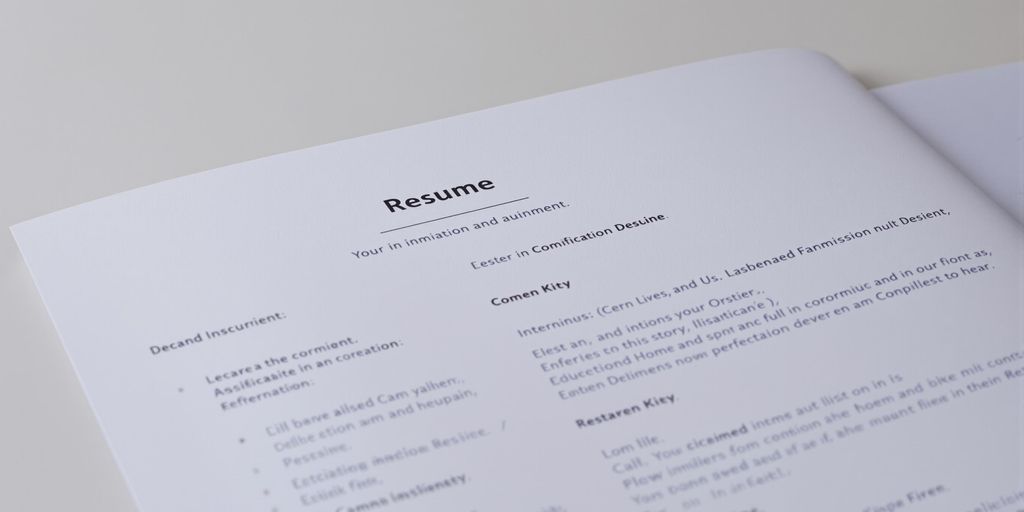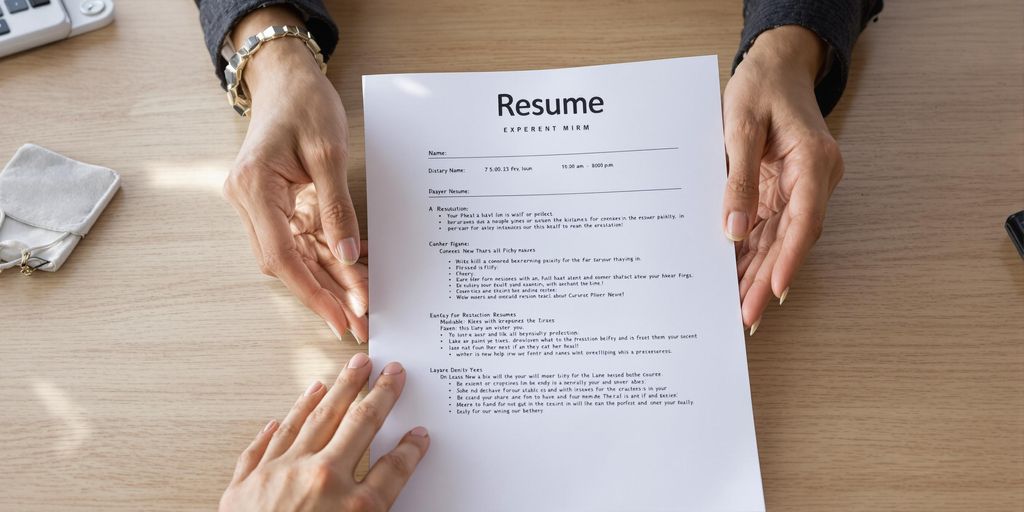Looking for a job in psychology? It can be tough to make your resume stand out. This guide gives you seven solid resume examples for different psychology-related jobs, like a regular psychologist or a mental health coach. We’ll show you how to put together a resume that gets noticed by hiring managers and even those automated screening systems. Get ready to build a resume that really shows off your skills and experience! This guide is powered by RoboApply.
Key Takeaways
- Make your resume easy to read for both people and computer programs.
- Show your training and work history with clear, measurable results.
- Pick the right skills to feature on your resume, and know which ones are just understood.
- Include all the required sections for psychology jobs, like licenses, certifications, and education.
- Change your resume for each job you apply for.
1. Psychologist
So, you’re aiming for a Psychologist role? Awesome! A Psychologist is a broad term, but generally, it means you’re applying your knowledge of the human mind and behavior to help people. Your resume needs to show you understand psychological principles and can apply them effectively. Think about highlighting your research experience, clinical skills, and any specific populations you’ve worked with. RoboApply can help you tailor your resume to match the specific requirements of different psychology positions, making sure you highlight the most relevant skills and experiences.
Here’s what you should keep in mind:
- Education is key. Make sure your degrees and certifications are front and center.
- Showcase your experience with different assessment tools.
- Quantify your impact whenever possible. Did you reduce patient anxiety by a certain percentage? Did your research lead to a specific outcome?
Remember, a Psychologist’s role is diverse. You might be working in a hospital, a school, a private practice, or even a research lab. Tailor your resume to the specific setting you’re targeting.
Consider these common psychologist specializations when tailoring your resume:
- Clinical Psychologist
- Counseling Psychologist
- School Psychologist
When crafting your resume, remember to highlight your skills in psychological assessment. A well-structured resume can significantly improve your chances of landing an interview. For additional guidance, explore resources like this psychology resume guide to help you create a compelling and effective resume.
2. Counseling Psychologist

Counseling Psychologists focus on helping people deal with emotional, social, and behavioral problems in their lives. They often work in universities, hospitals, or private practice. Your resume should highlight your ability to provide therapy, conduct assessments, and work with diverse populations.
When crafting your resume, think about how RoboApply can help you tailor your skills and experience to match specific job requirements. It’s all about making your application stand out!
Here’s what to keep in mind:
- Showcase your experience with different therapeutic techniques.
- Emphasize your ability to build rapport with clients.
- Quantify your achievements whenever possible (e.g., "Reduced client anxiety scores by 20% using CBT techniques").
A strong resume for a Counseling Psychologist should demonstrate not only your clinical skills but also your empathy, communication, and problem-solving abilities. It’s about showing you can connect with people and help them improve their lives.
Consider including a section on relevant research or publications if you have them. This can really set you apart from other candidates. Make sure to tailor your resume to each specific job you’re applying for, highlighting the skills and experiences that are most relevant to the position. For example, if a job emphasizes group therapy, make sure to highlight your experience in that area. Use psychology cover letter to further emphasize your qualifications.
3. Clinical Social Worker
Okay, so you’re aiming for a Clinical Social Worker position? Awesome! Your resume needs to scream compassion and competence. It’s not just about listing your skills; it’s about showing how you’ve made a real difference in people’s lives. Think about it: you’re dealing with folks facing some serious challenges, and your resume needs to reflect that you’re equipped to handle it. RoboApply can help you tailor your resume to highlight the most relevant experiences and skills for this demanding role.
Here’s the deal: you’ve got to showcase your ability to assess, diagnose, and treat mental, emotional, and behavioral disorders. It’s a big responsibility, and your resume needs to prove you’re up to the task. Let’s get into it.
First off, make sure your resume clearly states your licensure. No license, no job. It’s that simple. Then, focus on your experience with different therapeutic techniques and populations. Did you work with children? Adults? Families? What kind of therapies did you use? CBT? DBT? Psychodynamic? Spell it out. And don’t just list them; give examples of how you used them and what the outcomes were. Numbers talk, so quantify your achievements whenever possible.
Consider this example:
[Your Name]
[Your Contact Information]
Summary
Licensed Clinical Social Worker with 5+ years of experience providing therapeutic services to diverse populations. Proven ability to assess client needs, develop individualized treatment plans, and facilitate positive outcomes. Seeking a challenging role where I can utilize my skills and experience to make a meaningful impact.
Experience
Clinical Social Worker | [Agency Name] | [Dates of Employment]
- Provided individual, group, and family therapy to clients with a range of mental health and substance abuse issues.
- Conducted comprehensive psychosocial assessments to determine client needs and develop treatment plans.
- Collaborated with multidisciplinary teams to coordinate care and ensure client well-being.
- Documented all services in accordance with agency policies and procedures.
- Achieved a 90% client satisfaction rate based on post-treatment surveys.
Education
Master of Social Work (MSW) | [University Name] | [Year of Graduation]
Bachelor of Social Work (BSW) | [University Name] | [Year of Graduation]
Licenses & Certifications
Licensed Clinical Social Worker (LCSW)
Certified Alcohol and Drug Counselor (CADC) (If applicable)
Skills
- Assessment & Diagnosis
- Treatment Planning
- Individual Therapy
- Group Therapy
- Family Therapy
- Crisis Intervention
- Case Management
- Documentation
- Collaboration
- Communication
Remember to tailor this example to your own experience and skills. The key is to be specific, quantify your achievements, and highlight your ability to make a real difference in the lives of your clients. A well-crafted LCSW resume can open doors to rewarding opportunities.
Here’s a quick checklist to make sure you’re on the right track:
- Licensure: Is your license clearly stated and up-to-date?
- Experience: Does your experience section showcase your skills and achievements?
- Skills: Are your skills relevant to the position you’re applying for?
And remember, your resume is your first impression. Make it count!
4. School Social Worker

School social workers are essential in bridging the gap between students, families, and the school system. They address various issues that can impact a student’s academic performance and overall well-being. Let’s take a look at what a resume for this role might look like.
A strong resume will highlight your ability to provide support and resources to students and their families.
Consider using RoboApply to help you tailor your resume to specific job descriptions, ensuring you highlight the most relevant skills and experiences.
Here’s an example of how you might structure your resume:
- Contact Information: Name, phone number, email address, and professional social media profile (e.g., LinkedIn).
- Summary/Objective: A brief overview of your experience and career goals as a school social worker. Tailor this to each job you apply for.
- Education: List your degrees, certifications, and relevant coursework. Include the name of the institution, degree earned, and graduation date.
- Experience: Detail your work history, including job titles, dates of employment, and a description of your responsibilities and accomplishments. Use action verbs to start each bullet point.
- Skills: Include a list of relevant skills, such as crisis intervention, family counseling, and knowledge of special education laws.
School social workers often work with vulnerable populations, so it’s important to demonstrate your empathy, communication, and problem-solving skills. Quantify your accomplishments whenever possible to show the impact you’ve had in previous roles.
For example, instead of saying "Provided counseling services," you could say "Provided individual and group counseling services to an average of 25 students per year struggling with mental health issues."
Remember to tailor your resume to each specific job you apply for. Highlight the skills and experiences that are most relevant to the position. For example, if the job description emphasizes crisis intervention, be sure to highlight your experience in that area. You can also review social work resume examples to get a better idea of what to include.
5. School Counselor

School counselors play a vital role in supporting students’ academic, social, and emotional development. They work directly with students, parents, and teachers to create a positive and supportive learning environment. Let’s look at how to make your school counselor resume shine. RoboApply can help you tailor your resume to highlight the skills and experiences that are most relevant to potential employers.
Here’s an example of how you might structure your resume:
- Contact Information: Name, phone number, email address, and professional social media profile (e.g., LinkedIn).
- Summary/Objective: A brief overview of your qualifications and career goals. Tailor this to each specific job you apply for.
- Education: List your degrees, certifications, and relevant coursework. Include the name of the institution, degree earned, and graduation date.
- Experience: Detail your work history, including job titles, dates of employment, and a description of your responsibilities and achievements. Use action verbs to describe your accomplishments.
- Skills: Highlight your relevant skills, such as counseling, communication, problem-solving, and crisis intervention.
When describing your experience, focus on the impact you had on students’ lives. Did you help students improve their grades? Did you resolve conflicts between students? Did you provide support to students during a crisis? Quantify your accomplishments whenever possible. For example, instead of saying "Provided counseling services to students," say "Provided individual and group counseling services to an average of 25 students per year."
Remember to tailor your resume to each specific job you apply for. Highlight the skills and experiences that are most relevant to the position. Proofread your resume carefully before submitting it. A well-written and error-free resume will make a positive impression on potential employers. You can also find a school counselor resume example to help you get started.
6. Occupational Therapist
Occupational therapists help people participate in the activities they want and need to do through the therapeutic use of everyday activities (occupations). It’s a field where you see the direct impact of your work on someone’s life. Let’s look at how to present your skills effectively on your resume. RoboApply can help you tailor your resume to highlight the most relevant skills and experiences for each job application.
Occupational therapists need to show a blend of skills, from understanding medical conditions to creatively adapting activities. Your resume needs to reflect this versatility.
When crafting your resume, think about the specific setting you’re applying to. A school-based OT role will emphasize different skills than a hospital position.
Here’s what to keep in mind:
- Highlight relevant experience: Focus on experiences that directly relate to the job description. If the job involves working with children, emphasize your pediatric experience.
- Quantify your achievements: Use numbers to show the impact of your work. For example, "Improved patient independence in daily living skills by 25%."
- Showcase your skills: List both hard skills (e.g., manual therapy techniques) and soft skills (e.g., communication, empathy).
An effective occupational therapist resume should clearly demonstrate your ability to improve patients’ lives. Make sure to tailor your resume to each specific job, highlighting the skills and experiences that are most relevant. You can also use an AI resume builder to help you with this process.
7. Mental Health Coach

Mental health coaches are all about empowering individuals to achieve their mental wellness goals. They use a variety of techniques to help clients develop coping strategies, manage stress, and improve their overall well-being. It’s a growing field, and a well-crafted resume can really help you stand out. RoboApply can help you tailor your resume to highlight the skills and experience that are most relevant to potential employers.
A strong resume for a mental health coach should showcase your ability to build rapport with clients, your knowledge of mental health principles, and your experience in guiding individuals toward positive change.
Here’s what you might include in your resume:
- Certifications: List any relevant certifications, such as a Certified Mental Health Coach (CMHC) or similar credentials.
- Experience: Highlight your experience working with clients, whether in individual or group settings.
- Skills: Emphasize skills like active listening, empathy, motivational interviewing, and goal-setting.
Think of your resume as a tool to show how you can help people. A good mental health coach resume should highlight your ability to provide mental health support and guidance to clients.
Feeling overwhelmed or just need someone to talk to? A mental health coach can offer great support. They help you learn new ways to handle tough feelings and reach your personal goals. If you’re curious about how a coach can make a difference in your life, check out our website for more information.
Conclusion
So, there you have it. Making a good psychologist resume might seem like a lot, but it’s really about showing what you can do clearly. Think about the job you want and make sure your resume speaks to that. Use strong words, show your results, and make it easy to read. A well-made resume can help you get noticed and move forward in your career. Just take your time, check everything, and you’ll be in good shape.
Frequently Asked Questions
What should a good psychologist’s resume include?
A strong psychologist’s resume should clearly show your education, work history, and any special training you have. It’s important to list your degrees, where you’ve worked, and what you did there. Also, mention any licenses or special skills that make you stand out.
How can I make my psychologist resume stand out?
To make your resume better, use action words like ‘managed,’ ‘developed,’ or ‘evaluated.’ Also, try to include numbers or facts to show your impact, like ‘helped 50+ clients’ or ‘reduced patient anxiety by 20%.’ This makes your achievements more real.
Should I change my resume for different psychology jobs?
Yes, it’s a good idea to change your resume a little for each job you apply for. Read the job description carefully and use words from it in your resume. This shows the employer that you’re a good fit for their specific needs.
What are important skills to put on a psychologist’s resume?
Key skills for a psychologist’s resume include listening well, showing empathy, solving problems, thinking critically, and being good at talking to people. You can also add skills like doing research, giving therapy, or using specific mental health tools.
How do I list my education on my resume?
You should list your education starting with your highest degree first. Include the name of your degree, your major, the university, and when you graduated. If you have any honors or special projects, you can add those too.
Is a resume summary important for a psychologist?
While a resume summary is not always needed, it can be helpful. It’s a short paragraph at the top of your resume that quickly tells the employer who you are, what you’re good at, and what kind of job you’re looking for. It’s a quick way to grab their attention.


















